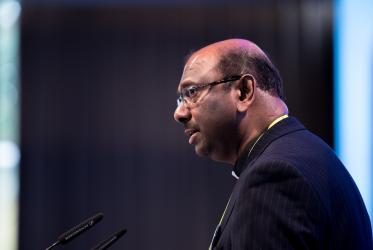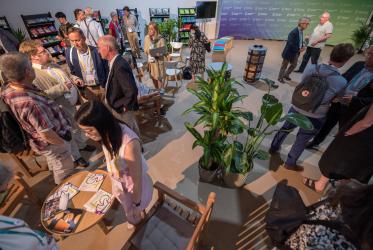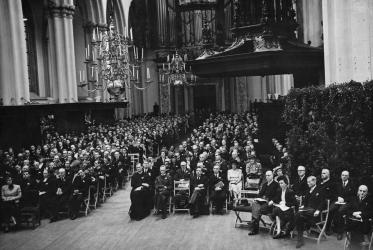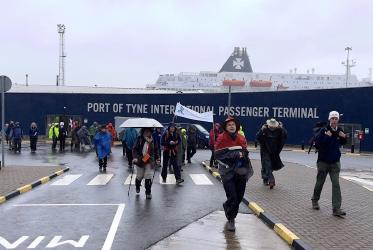Protestant Church in the Netherlands
(Protestantse Kerk in Nederland)
The Protestant Church in the Netherlands came into being in May 2004, through the merger of two churches of the reformed (Calvinistic) tradition and one Lutheran church: the Netherlands Reformed Church, the Reformed Churches in the Netherlands, and the Evangelical - Lutheran Church in the Kingdom of the Netherlands.
The "established church" in the Netherlands after the Reformation was Calvinistic. It had adopted the Belgic Confession, the Heidelberg Catechism and the Canons of Dordt. When the Netherlands became a monarchy in 1815 the king gave it a church order and it received the name of Netherlands Reformed Church. This action of the state was one of the reasons for two splits in 1834 and 1886. The two groups that separated merged in 1892 to form the Reformed Churches in the Netherlands. Besides the Calvinistic mainstream there had also been an Evangelical Lutheran Church in the Netherlands since 1556. In the aftermath of World War II there was an increasing awareness in the two large Reformed churches that their continued separation could not but affect the credibility of the gospel. In 1961 a group of 18 young theologians, all working in ministries on the frontiers of church and society, called on the synods to set out on a common journey. Discussions began. In 1986 the two synods declared that they were in a "state of union". Soon after, the Lutherans joined the "Together on the Way" process. It was decided that a new church order was necessary, based on an ecclesiological vision rather than a collection of pragmatic arrangements. This church order was adopted in 2003. It declares, among other things, that the church shares in the expectation of the people of Israel and therefore, as a Christ-confessing community of faith, seeks dialogue with Israel. It also clearly expresses the place of the church in the "oikoumene". In addition to the three ecumenical creeds and the above-mentioned confessions the church also accepts the Unaltered Augsburg Confession and Luther's Catechism.
At the national level there is total union. Locally the congregations have the freedom to unite (several hundreds have done so) or to maintain the specific tradition they belonged to before the union. The church order offers much space for local diversity and invites the local communities to engage in discussions between different traditions and spiritualities, e.g. to discover what the Lutheran identity can offer to the whole of the church, and what the Calvinistic tradition can mean for the Lutherans.
One of the main challenges for the PCN is the far-reaching secularization in the Netherlands. A large part of the population no longer counts itself as believer. An increasing number of believers live their faith outside the framework of the church. At the same time the migrant churches are flourishing in and around the urban centres. They are very active in mission and diakonia. This is yet another challenge to the Protestant Church in the Netherlands, to reflect on how to transmit the gospel message to others in a credible and contemporary manner. It was the main issue on the agenda of the very first synod meeting of the PCN in May 2004. The church order speaks of the calling to confess Jesus Christ as Lord and Redeemer of the world in "celebrating, speaking and acting". Thus the church recognizes also its social and political responsibility, which invites the church to appeal and work for renewal in culture, society and nation. Dutch society cannot exist without an inspiring texture. That determines also the responsibility of the church with regard to migrants and asylum seekers. The growing contacts with the Muslim community are part of it as well. The church is called to make its own voice heard and to make it clear that a common commitment is required in the struggle against poverty and injustice.
The PCN has adopted the presbyterian-synodal model of church governance with a board (moderamen) and a moderator and general secretary. Its national office and service centre are located in Utrecht. The missionary and diaconal work of the PCN is carried out in cooperation with several smaller churches in the Netherlands, under the banner of "Kerkinactie" (Churches acting together). The church maintains international relationships with many partner churches in all parts of the world (e.g. more than thirty in Indonesia).





